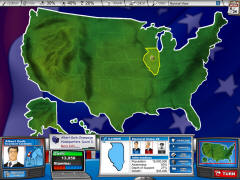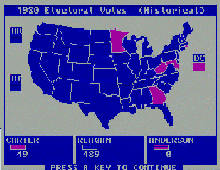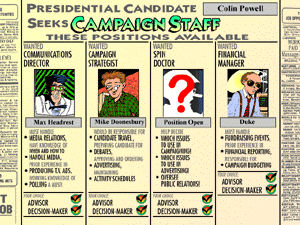I renewed my drengin.net subscription today, specifically so I could get access to the beta test of Brad Wardell’s still-in-development election game The Political Machine.

The Political Machine
I’m a big fan of Brad’s games, and have long felt that he brought an exciting independent voice to PC gaming. I don’t play too many PC games anymore, what with the Xbox filling so many of my needs and my main leisure computing platform being a Mac. But that’s my problem, not Brad’s, and I figured if anyone would make an interesting game for that platform it would be him. So I bit the bullet to take a look. Please keep in mind that I’m being a little unfair to Brad here in reviewing what’s basically an alpha. I promise I’ll review it again once the final version is released and all the bugs are worked out. I’m deliberately not going to talk about any bugs I might encounter now because, hey, fixing the bugs is what beta-testing is for.
I approached this game with a little trepidation, since I’ve recently discovered that Brad’s politics are a little on the fringe. Well, let’s be honest: in my opinion, he’s a right-wing kook. My biggest fear was that this stridency would translate into the game as bias. So the big news from my corner is: no need to worry. Candidates are free to take any position; positions have effects on Democrats, Republicans, and Independents. And if I disagree with some of the particular choices that Brad made (if you think all Democrats oppose gun control — or, for that matter, the war in Iraq — you need to get out more), they’re all at least good-faith arguable as caricatures, which is probably the most we can expect from an election game. More to the point, those choices are balanced in game terms. It’s clear that whatever political beliefs Brad has take a back seat to his design sensibilities. That’s a good thing. There are also facilities not yet implemented but clearly on-the-way to edit the attributes associated with each candidate. This is good, because even if Mr. Wardell gets things “wrong” (according to my personal biases), I’ll be able to fix them. Lastly, there’s a facility that I haven’t tried yet for setting up a “fantasy scenario” where states don’t have their real-world leanings (you could make a Massachusetts that was strongly Republican, for example).

President Elect 1988
The gold standard of election games would be SSI’s President Elect. It had a intriguing resource allocation system where you would basically ‘swing’ through a series of related states on tours, and you had to decide how much time you’d spend campaigning in each region or state. Periodically, you’d go into a debate and try to avoid taking any controversial stances. I like The Political Machine more than President Elect, as a game. That might be unfair to the older game, since it’s clear that its author intended it to be viewed as a serious simulation (and if my results in 1984 and 1988 were anything to judge by, it was a damn effective simulation — it called both elections perfectly, for me. If I had a football simulator that good, I’d be rich.) The Political Machine does not feel like a good simulator to me (where’s the “start campaign with $200,000,000 already in the war chest” button?), but it does feel like a good game.

Doonesbury Election Game
I also like it more than the underrated (if flawed) Doonesbury Election Game, even if that did have a bit more built-in character (and a hideous user interface). The UI on The Political Machine is something I’m still trying to come to grasp with. Basically, it’s an updated and morphed version of the UI from The Corporate Machine. I’m a little uncomfortable with the UI in the game, so far, but some of that may just be that I’m vaguely discomfitted that it’s not exactly like the Corporate Machine in every way. Maybe that’ll shake off after a few more games.
The core aspect of the game is: you have 41 weeks (turns) before the election. There are two primary resources: money, and stamina. Money buys advertising campaigns and campaign headquarters which increase your name recognition. Your candidate has so many points of stamina he can spend each week; stamina can be spent earning political capital (“back room deals”), giving speeches on the campaign trail, flying from state to state, or, most importantly, fundraising. Political capital is a secondary resource which can be spent to buy campaign aides (consultants, spin doctors, the guys that broke Nancy Kerrigan’s kneecaps) or political endorsements. It’s the balance between fundraising and the other activities that seems to be the key mechanic in the game. Spend too much time fundraising and your message doesn’t get out and, paradoxically, there will be less money available to you. Spend not enough time fundraising and you’ll find yourself stranded in Indiana, unable to even afford plane fare.
Trust me. You don’t want to get stranded in Indiana.
One aspect of the game that I’m looking forward to improving is the availability of more candidates. One of my favorite activities in President Elect was running fantasy candidates against Ronald Reagan and seeing what happened. I was pretty much never able to come up with a major politician that President Elect didn’t already have modeled. That impressed me. It’s a steeper hill for The Political Machine since they have spiffy cartoon caricatures of their candidates, so there’s an art cost associated with including more of them that the earlier games didn’t have to bear. But I hope they do add as many as they can, anyway.
I have not tried the networked multiplayer game yet. I’m looking forward to it, though.
In a lot of ways The Political Machine feels like a mini-scenario for The Corporate Machine. That’s meant to be a compliment, not a criticism. Behind the flash of the interface I see some of the same Risk-like proximity effects going on. As the game nears completion it will be fun to discover more ways in which it diverges from its elder sibling. Cheers to Brad (and to Stardock) for keeping the flame of small, independently produced games burning.
Additional Resources
All politics is retail:
- You can obtain The Political Machine by subscribing to Drengin.net. It’s for the Windows platform. Subscribing to Drengin also gets you some neat other games, like Galactic Civilizations and The Corporate Machine. Now if we can just convince Stardock to join the OS X tidal wave…
- If you’d like to play President Elect, you can. As always, I prefer the Apple ][ versions, either 1984 or 1988
- A nice overview of The Doonesbury Election Game.





What platform is this for? Windows? Web-based? Mac? The web site seemed to pretty much have a link to a screenshot.
Sorry, I thought “PC based” covered it — it’s a Windows game (as is all the dregin.net/Stardock stuff). I’ll update the review.
You might be interested in a presidential election game that’s out for 2004 called President Forever. Info is here: http://www.presidentforever.com .
The “you can” link for President Elect does not seem to be working.
Thanks, Don! I fixed the link.
Hey! I did the Commodore 64 port for President Elect in 1988, so obviously I prefer that version.
Ken,
You can’t expect me to let you just drop in here, fire off that salvo, and leave, can you? Our readers demand details — how hard was the port? What was the biggest challenge? Are there any specific hacks that come to your mind when you think of the game? What have you been working on since?
Cheers,
peterb
The original program was written in Apple Basic. There were some syntax differences with Commodore Basic plus all the graphics routines had to be rewritten from scratch. I had to create the election map line by line by hand, tweaking it after I was done to make all the states look right and fill up the screen.
I had to write a fill algorithm to fill up the states with the right colors on election night. The hardest part was all the testing especially with third party candidates.
The basic algorithm of the program is that if the economy is good and the nation is at peace, then it is very hard to beat an incumbent.
I was working as an independent contractor. That was a time when a single programmer could create a game. I wrote some games on my own too:
http://s64.emuunlim.com/gameinfos/tournamentgolf/tournamentgolf.htm
http://pirates.emucamp.com/a/d/doughboy/c64/main.html
Since then I’ve been writing Process Monitoring Software for OSIsoft: http://www.osisoft.com
Ken